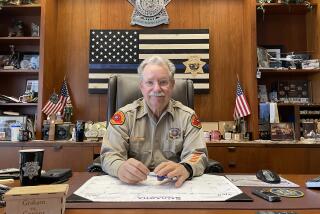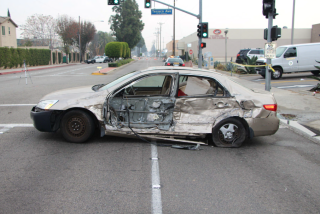Deputies used military first-aid materials to help save Tucson victims
Reporting from Tucson — Pima County sheriff’s deputies responding to the shooting of Rep. Gabrielle Giffords had military-grade first-aid materials, which probably helped save the lives of some of the 19 shooting victims, authorities said Friday.
The department held a news conference to tout the packages, which it distributed to deputies last June. Officials said they hoped other law enforcement agencies would start programs like theirs, which they say enables them to provide care in the critical minutes before ambulances arrive at shooting scenes.
“Without this care it would have definitely been a different situation,” said Dr. Katherine Hiller, who treated the wounded in the emergency room at University Medical Center on Jan. 8. Thirteen survived, including Giffords. Six died.
The deputies’ packages include a combat-grade bandage — sometimes referred to as an “Israeli bandage” — that can stanch massive bleeding, along with combat gauze and a pad that seals sucking chest wounds.
It’s the sort of equipment routinely carried by troops in Iraq and Afghanistan. Sheriff’s officials decided last summer that deputies should have it for violent crime scenes or accidents. Capt. Byron Gwaltney called it “laying a foundation of care” before ambulances take the injured away.
Gwaltney said increasing numbers of departments are training their officers to use military-grade first-aid equipment, a big change from the days when police arrived at violent scenes with just a CPR mask and bandages.
When Deputy Gilbert Caudillo arrived at the shooting scene outside a Tucson Safeway, he was stunned at the mass of bloodied bodies. “It was a silent chaos,” he recalled Friday.
He began swiftly performing triage to determine whose injuries were severe enough to require immediate treatment. He wrapped one bloodied wound with combat gauze and began performing CPR on an injured woman. Sheriff’s officials said Caudillo couldn’t publicly identify the people he worked on.
Deputies kept ambulances away for about six minutes, until they were certain there were no other gunmen.
“It felt like forever,” Caudillo said. “It felt like we were there on our own for a long time.”
When many patients arrived at the emergency room, Hiller said, their blood pressure and heart rates were stable because deputies had stanched bleeding from traumatic injuries.
“I would think we saved some lives,” Caudillo said.
More to Read
Sign up for Essential California
The most important California stories and recommendations in your inbox every morning.
You may occasionally receive promotional content from the Los Angeles Times.










